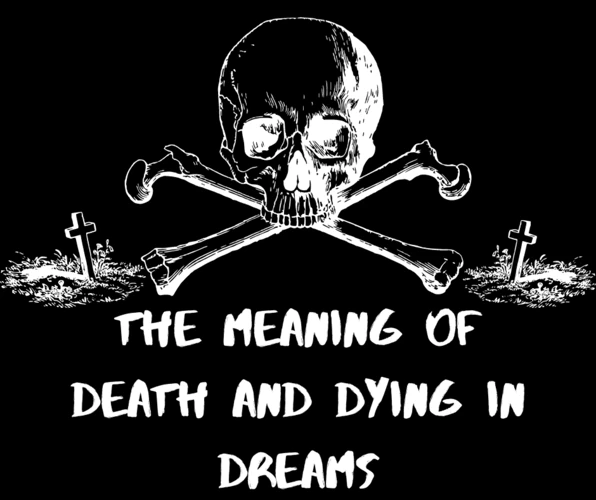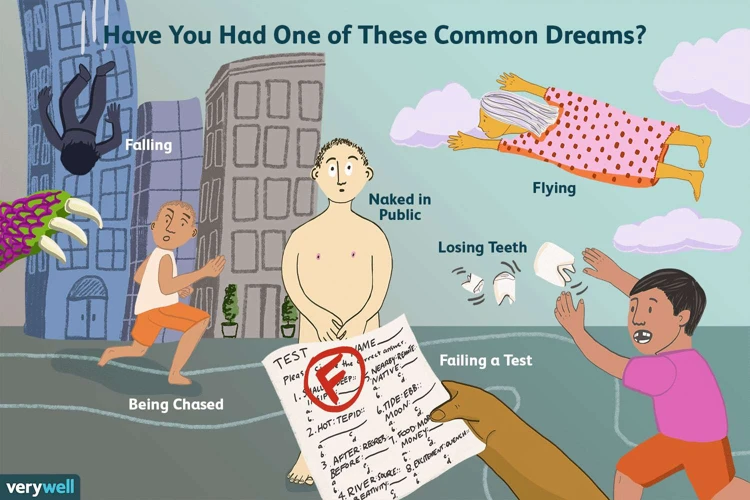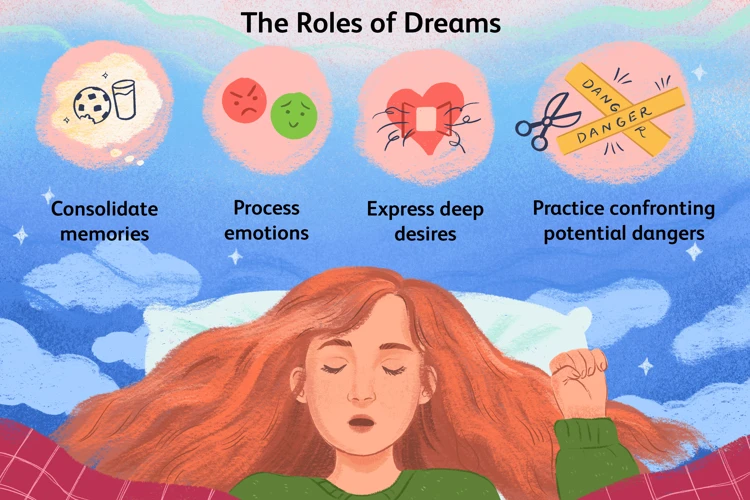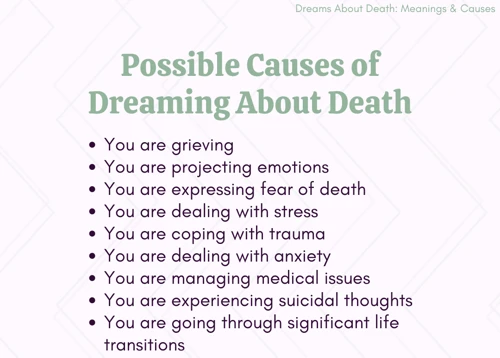When we close our eyes and drift off to sleep, we enter a mysterious realm where our subconscious mind takes center stage. Dreams have fascinated humans for centuries, offering insight into our deepest fears, desires, and emotions. Among the many themes that frequently appear in dreams, death and its symbolism hold a particularly enigmatic power. Exploring the meaning behind death symbols in dreams can provide a unique window into our innermost thoughts and feelings. In this article, we will delve into the rich tapestry of death symbolism in dreams, examine the psychology behind these dreams, and interpret specific death-related dream scenarios. Prepare to embark on a journey through the ethereal landscapes of dreams and discover the profound significance of death within them.
Exploring Death Symbolism in Dreams

Exploring Death Symbolism in Dreams allows us to unlock the hidden meanings and significance that death holds within the realm of our subconscious mind. In dreams, death symbols can take many forms, reflecting our fears, anxieties, and contemplations on mortality. Common death symbols in dreams include gravestones, funerals, skeletons, and even encounters with deceased loved ones. Each symbol carries its own unique message and interpretation, shedding light on our deepest emotions and desires. Interpreting these symbols requires a keen understanding of cultural differences as well, as interpretations may vary across different societies. By delving into the psychology behind death dreams, we can gain insights into our fears and anxieties, the potential for transformation and rebirth, and our reflections on the impermanence of life. Through this exploration, we can better grasp the meaning and significance of death symbolism in dreams and utilize it as a tool for personal growth and self-reflection.
1. Common Death Symbols in Dreams
1. Common Death Symbols in Dreams:
In the realm of dreams, death symbols manifest in diverse ways, each carrying its own unique significance. Here are some common death symbols that frequently appear in dreams:
– Gravestones: Gravestones symbolize the finality of death and the notion of mortality. They serve as a reminder of the impermanence of life and may signify feelings of loss, grief, or the need to let go of the past.
– Funerals: Dreaming of attending a funeral represents the process of closure and acceptance. It may indicate the need to acknowledge and mourn a loss in waking life. This symbol can also represent the end of a phase or a significant change in one’s life.
– Skeletons: Skeletons in dreams often symbolize our own fears and insecurities. They remind us of the vulnerability and fragility of life. Seeing a skeleton in a dream can be a reflection of unresolved issues or the need to confront hidden aspects of ourselves.
– Deceased Loved Ones: Dreams involving deceased loved ones can be deeply emotional. These dreams may evoke feelings of nostalgia, longing, or unfinished business. They can serve as a way for our subconscious mind to process grief or to seek guidance from the departed.
It’s important to note that the interpretation of these symbols may vary depending on the context and personal experiences of the dreamer. It is crucial to consider the individual’s emotions and associations attached to these symbols when analyzing their meaning within a dream. Exploring the intricate symbolism of death in dreams allows us to gain a deeper understanding of our own emotions, fears, and desires, granting us insight into our innermost selves.
Learn more about the symbolism of falling dreams.
2. Interpreting Death Dreams
Interpreting Death Dreams opens a gateway to understanding the profound messages and symbolism embedded within these enigmatic nighttime visions. When confronted with dreams of death, it is important to approach them with an open mind and a willingness to explore their deeper meanings. One strategy for interpretation is to analyze the specific symbols present in the dream. For example, dreaming of a skeleton may represent the idea of transformation and the shedding of old beliefs or behaviors. Similarly, encountering a loved one who has passed away in a dream could symbolize unresolved emotions or a need for closure. It is also crucial to consider the emotions evoked by the dream. Feelings of fear or anxiety may indicate the need to confront and overcome obstacles in waking life, while experiencing peace or acceptance in a death dream could signify emotional healing or acceptance of change. Cultural influences also play a role in the interpretation of death dreams, as beliefs and attitudes towards death may vary across different societies. By analyzing the symbols, emotions, and cultural factors at play, one can gain a deeper understanding of the underlying messages within death dreams and apply these insights to personal growth and self-reflection. For more information on unraveling dream symbolism, you can explore our article on the symbolism of dreams and flying.
3. Cultural Differences in Death Symbolism
Cultural Differences in Death Symbolism play a significant role in the interpretation of death-related dreams. Death symbols and their meanings can vary greatly across different cultures and societies. For example, in Western cultures, a common symbol of death is a skull, often associated with fear and mortality. However, in certain cultures, such as Mexico’s Day of the Dead celebration, skulls (or calacas) represent a vibrant celebration of the deceased, symbolizing the continuation of life beyond death. In Hinduism, death is seen as a natural part of the cycle of reincarnation, and dreams related to death can be interpreted as a sign of spiritual growth and transformation. These cultural nuances highlight the importance of considering the cultural background and beliefs when analyzing death symbolism in dreams. It is crucial to refrain from imposing our own cultural perspectives onto the dreams of others. Embracing cultural diversity allows for a deeper understanding of the rich tapestry of symbols and meanings associated with death in dreams. By recognizing and respecting these cultural differences, we can gain a more nuanced interpretation of death-related dreams and appreciate the diverse perspectives that shape our collective human experience. (Reference: Symbolism of Dreams: Money)
Understanding the Psychology of Death Dreams

Understanding the Psychology of Death Dreams is crucial in unraveling the deeper meanings behind these profound subconscious experiences. One of the primary emotions associated with death dreams is fear and anxiety, as death represents the unknown and the ultimate finality. These dreams can serve as a psychological outlet for processing our fears and anxieties surrounding mortality. Additionally, death dreams can also symbolize transformation and rebirth, representing our desire for personal growth and the shedding of old patterns. They may serve as a reminder of the impermanence of life and encourage us to reflect on our own mortality. By delving into the psychology of death dreams, we can gain insights into our psyche, navigate our emotions, and find comfort in the symbolic messages that arise from these vivid and captivating dreamscapes.
1. Fear and Anxiety
Fear and anxiety are common emotional responses that can be triggered by death symbolism in dreams. When we encounter death-related symbols in our dreams, they can evoke a strong sense of fear and unease. The fear of death is deeply ingrained in human psychology, and these dreams can tap into our primal instincts and existential concerns. Death dreams often confront us with the concept of our own mortality, forcing us to confront the inevitability of death and the unknown that lies beyond. They can serve as a reminder of our vulnerability and the fragility of life. It is important to recognize that these dreams are not literal predictions of our own demise, but rather symbolic reflections of our fears and anxieties. By exploring and acknowledging these fears, we can gain a better understanding of ourselves and work towards overcoming these emotional challenges. Embracing death symbolism in dreams with a sense of curiosity and courage can lead to personal growth and the development of coping strategies for managing anxiety in waking life.
2. Transformation and Rebirth
Transformation and rebirth are powerful themes that often emerge in dreams related to death. When death symbolism appears in our dreams, it can signify the end of a phase or the shedding of an old identity. This can be a transformative process, where we let go of the past and embrace new beginnings. Dreams of death and rebirth might involve scenarios such as emerging from a coffin or being reborn as a different person or creature. These dreams symbolize personal growth, self-discovery, and the opportunity for a fresh start. They can also represent a desire for change or a need to leave behind aspects of ourselves that no longer serve us. It is important to view these dreams as positive signs of transformation rather than literal predictions of death. By embracing the symbolism of transformation and rebirth in dreams, we can harness the power of change and embark on a journey of personal evolution.
3. Reflections on Mortality
Dreams that incorporate death symbolism often serve as a catalyst for deep reflections on mortality. When we dream of death, it confronts us with the fragility and impermanence of life. It forces us to ponder our own mortality and contemplate the brevity of our existence. These dreams can evoke a wide range of emotions, such as fear, sadness, or even acceptance. It is during these moments of reflection that we may find ourselves contemplating the meaning and purpose of our lives. We may question the choices we have made, the impact we have had on others, and what legacy we will leave behind. The symbolism of death in dreams acts as a powerful reminder to live each day to the fullest and to cherish the moments we have with loved ones. It encourages us to let go of trivialities and focus on what truly matters in life. These reflections on mortality that arise from death dreams can be a transformative experience, leading to a greater appreciation for the present and a reevaluation of our priorities.
Interpreting Specific Death-related Dream Scenarios

Interpreting specific death-related dream scenarios offers a deeper understanding of the messages and symbols that our subconscious mind is trying to communicate. Dreaming about the death of a loved one, for instance, may not always be about literal death, but rather symbolize a transformation or change in the relationship. It may reflect the need for emotional closure or the fear of losing someone we hold dear. In contrast, dreaming of one’s own death can signify personal growth and self-transformation, indicating a need to let go of old patterns or beliefs. Another intriguing scenario is dreaming of death and resurrection, which can represent a desire for renewal and a fresh start. Symbolic deaths in dreams, such as the death of an animal or fictional character, can hold personal significance and mirror aspects of ourselves or our lives that require attention. By delving into these specific dream scenarios, we can decode the hidden meanings and gain valuable insights into our psyches.
1. Dreaming about the Death of a Loved One
Dreaming about the death of a loved one is a particularly intense and emotionally charged dream scenario. This dream can evoke feelings of grief, sadness, and vulnerability. However, it is important to understand that these dreams do not necessarily predict or foreshadow the actual death of the person in question. Instead, they often symbolize significant changes or transitions occurring in the relationship or within ourselves. The death of a loved one in a dream can represent the end of a certain phase or aspect of the relationship, indicating the need for growth, healing, or letting go. It may also reflect unresolved emotions or unfinished business with the person who has passed away. These dreams can serve as an opportunity to process grief, confront unresolved issues, and find closure. Additionally, dreaming of the death of a loved one can serve as a reminder to value and cherish our relationships while we have them. It’s important to approach these dreams with compassion and to seek support from loved ones or professionals if needed, as they can be emotionally challenging experiences.
2. Dreaming of One’s Own Death
Dreaming of one’s own death is a haunting and thought-provoking experience that can elicit intense emotions and deep contemplation. When we dream of our own demise, it is natural to feel a sense of fear and dread. However, these dreams often carry symbolic meanings rather than literal premonitions of our impending doom. Dreaming of one’s own death can symbolize a profound transformation or a significant change that is occurring or needs to occur in our waking life. It may represent the end of a chapter, the closure of a relationship or job, or the shedding of an old identity to make way for personal growth and renewal. These dreams can also serve as a reminder of our own mortality, prompting us to question the purpose and meaning of our existence. While dreaming of one’s own death can initially evoke feelings of unease, it is essential to approach these dreams with an open mind and explore the underlying symbolism and messages they hold. By embracing the symbolic nature of these dreams, we can gain valuable insights into our personal journey and navigate life’s transitions with a renewed sense of purpose and understanding.
3. Dreaming of Death and Resurrection
Dreaming of Death and Resurrection is a captivating and profound experience that often leaves us with a sense of awe and wonder. In these dreams, the theme of death is intertwined with the idea of rebirth and renewal, creating a powerful symbol of transformation. These dreams may symbolize personal growth, the shedding of old habits or beliefs, and the embrace of new beginnings. They can also represent the process of overcoming challenges and adversity, rising from the ashes like a phoenix. The imagery in these dreams may vary, ranging from witnessing our own death and subsequent resurrection to observing the resurrection of others. It is important to note that dreams of death and resurrection are not necessarily literal predictions of a literal death and rebirth but rather symbolic representations of personal transformation. The emotions evoked in these dreams can range from fear and uncertainty to hope and liberation. Reflecting on these dreams can offer valuable insights into our own capacity for change and renewal, as well as the endless possibilities that abound in our lives. Embracing the symbolism of death and resurrection in dreams can empower us to face challenges head-on and embrace the transformative power within ourselves.
4. Dreaming of Symbolic Deaths
Dreaming of Symbolic Deaths can often present itself as a thought-provoking and emotionally charged experience within the realm of dreams. These dreams involve death scenarios that carry a deeper symbolic meaning rather than a literal interpretation. Symbolic deaths in dreams can manifest in various ways, such as the death of a part of ourselves, the end of a relationship or a chapter in our lives, or the shedding of our old beliefs and habits.
One example of symbolic death dreams is the imagery of a dying animal. This can symbolize the loss of our primal instincts or a disconnection from our own instinctual nature. It may also represent the need for us to release certain behaviors or ideas that no longer serve us.
Another common form of symbolic death dreams is witnessing a burial or funeral. This can signify the end of a significant phase or transition in our lives, such as the completion of a project, the closure of a chapter, or the mourning of a lost opportunity. It may also represent the need to let go of past regrets or emotional attachments.
Dreaming of our own death in a symbolic sense is also possible. This can indicate a desire for personal transformation and renewal, as well as a longing for a fresh start or a second chance. It can serve as a powerful reminder of the potential for growth and change within ourselves.
Interpreting these dreams requires careful introspection and reflection on the symbolism and emotions present. It is essential to consider the specific details and context of the dream, as well as our own personal experiences and feelings. Keeping a dream journal can help in identifying patterns and recurring themes related to symbolic deaths in dreams, allowing us to gain a deeper understanding of ourselves and the transformative potential these dreams hold.
Dreaming of symbolic deaths offers us an opportunity to explore our subconscious fears, desires, and aspirations. It challenges us to embrace change, let go of the past, and embark on a journey of self-discovery and personal growth. By unraveling the symbolism within these dreams, we can gain valuable insights into our own psyche and navigate our waking lives with a renewed perspective and purpose.
The Role of Death in Lucid Dreaming
Lucid dreaming, a state in which the dreamer becomes aware that they are dreaming, offers a unique perspective on the role of death within the dream world. In this heightened state of consciousness, individuals have the ability to exert control over their dreams, including the presence and significance of death symbols. For some, death in lucid dreams can be a powerful tool for self-exploration and personal growth. By confronting and overcoming the fear of death within the safe confines of the dream world, individuals may experience a sense of empowerment and liberation in their waking lives. Death in lucid dreams can also serve as a catalyst for transformation, allowing dreamers to symbolically shed old ways of thinking and embrace new beginnings. However, it is important to note that the role of death in lucid dreaming can vary significantly from person to person. Some individuals may find the experience of confronting death in dreams to be jarring or unsettling, while others may choose to avoid or manipulate death symbols altogether. Ultimately, the role of death in lucid dreaming is highly personal and influenced by the dreamer’s beliefs, fears, and aspirations.
Conclusion
In conclusion, the exploration of death symbolism in dreams unveils a fascinating realm of the human psyche, offering valuable insights into our deepest fears, desires, and reflections on mortality. Dreams have a unique way of communicating these themes through intricate and often enigmatic symbolism. By analyzing common death symbols in dreams and understanding their interpretations, we gain a deeper understanding of our own subconscious thoughts and emotions. Furthermore, the psychology behind death dreams reveals the complex interplay between fear and anxiety, transformation and rebirth, and contemplation of the impermanence of life. It is important to recognize that the symbolism of death in dreams can vary across cultures, emphasizing the significance of cultural context in dream interpretation. As we unravel the complexities of death-related dream scenarios, such as dreaming of the death of a loved one or dreaming of our own death, we uncover profound insights into our own emotional landscapes. Additionally, dreams that involve death and resurrection or symbolic deaths provide further layers of meaning and potential for personal growth. Lastly, the role of death in lucid dreaming allows for conscious exploration and transformation within the dream state. By embracing the symbolism of death in dreams, we unlock a deeper understanding of ourselves and the universal questions surrounding life and mortality. Dreams serve as a bridge between the conscious and unconscious, inviting us to explore the profound mysteries of our inner world.
Frequently Asked Questions
1. What does it mean if I dream about someone dying?
Dreaming about someone’s death can symbolize the end of a certain aspect of your relationship with that person or signify the need for change and growth in your connection. It may also reflect unresolved emotions or fears surrounding the individual.
2. Are death dreams always negative?
No, death dreams can have various meanings and interpretations. While they can sometimes evoke anxiety or fear, they can also represent transformation, new beginnings, or the release of burdens or past experiences.
3. What does it mean if I dream about my own death?
Dreaming of your own death often symbolizes a significant change or transition happening in your waking life. It may indicate personal growth, the need for self-reflection, or a desire to let go of certain aspects of yourself.
4. Can death dreams predict actual death?
No, death dreams do not have the ability to foresee or predict actual death. Dreams are a product of our subconscious mind and are influenced by our thoughts, emotions, and experiences.
5. Why do cultural differences affect the interpretation of death dreams?
Cultural beliefs and traditions around death vary greatly, influencing how death and its symbolism are perceived and interpreted. The cultural context of an individual can provide valuable insights into understanding the symbolism and meaning behind their death dreams.
6. How can I interpret my death dreams more accurately?
To interpret death dreams more accurately, it is crucial to consider the emotions, symbols, and personal experiences associated with the dream. Keeping a dream journal and exploring your feelings and thoughts surrounding the dream can provide deeper insights.
7. Are there any positive meanings to dream about funerals?
While funerals in dreams are often associated with loss and grief, they can also symbolize closure, acceptance, or the need to honor and let go of past experiences or relationships. The interpretation depends on the individual’s emotions and circumstances.
8. Can dreaming about death affect my waking life?
Dreams, including death dreams, can have a psychological impact on our waking life. They can evoke powerful emotions, prompt self-reflection, and provide an avenue to explore subconscious thoughts and fears, potentially leading to personal growth and self-awareness.
9. How do death dreams relate to lucid dreaming?
In lucid dreaming, where the dreamer is aware they are dreaming, death-related themes can arise. Lucid dreamers can use death symbolism as an opportunity for self-exploration, confronting fears, or experimenting with the concept of transformation and rebirth within the dream state.
10. Can dream symbols of death act as warnings or guidance?
While dream symbols, including those related to death, can offer insights and guidance, they are not necessarily literal warnings. It is essential to approach dream interpretation with an open mind and consider the overall context and emotions of the dream before attributing specific predictions or meanings.








